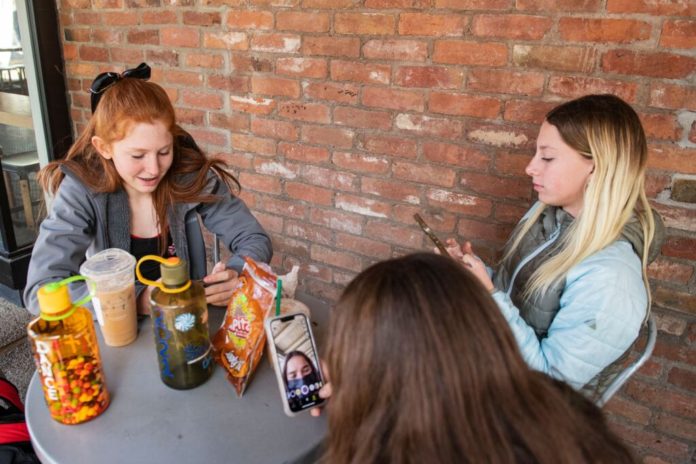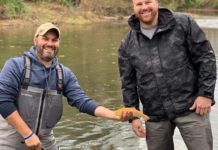This month’s “Time to Talk” mental health support group met somewhere it’s never convened before: the metaverse.
It’s a virtual world in which avatars all represent real people who gather on platforms like Decentraland, which hosted the Oct. 13 meeting by broadcasting it on a virtual screen in a virtual movie theater.
That’s a whole lot of online, but the challenges users face offline, like anxiety and depression, are very much the same as those they might face in the digital sphere too, said Andy Godfrey, who leads the monthly meetings organized through the mental health advocacy organization Aspen Strong.
“One of the questions from one of the avatars was, ‘Why are you doing this? Why did you pick this venue?’ … I think many of those real world problems that we have here will be similar problems in the metaverse,” Godfrey said. The platform also adds another level of anonymity because participants can choose their usernames and avatars.
Godfrey chose the metaverse as a new venue for the support group in hopes it might widen the audience from its usual half dozen or so Zoom participants, and it worked: the meeting garnered 30 unique viewers, he said. Part of the aim, too, is to reach younger audiences by meeting teens and young adults where they are: the internet.
Andy Godfrey/Courtesy image
It’s one of a number of initiatives Aspen Strong has launched to reach and provide mental health support for a younger demographic. The organization helped plan a yoga series led by high schoolers this summer; there’s also a series that will combine activities that might include fly fishing or jewelry making with conversations about mental health and plans to offer a nutrition course in the works, according to Aspen Strong Executive Director Angilina Taylor.
But Taylor recognizes that the activities the organization launches with young people in mind might not always reach their target audience. It’s one of the reasons Aspen Strong is looking to assemble a board of younger mental health advocates who can inform the organization on what types of events and programs kids and young adults will actually engage in.
“From the adult perspective, we’re like, ‘These are so cool. Oh my gosh, I wish I had this when I was a youth,’” Taylor said. “But when you think about when you were younger, would you have gone, and what would have gotten you to go? … If they’re not going to show up, what’s the point?”
Taylor recognizes there may be barriers like “approachability” that are standing between young people and resources that could help support them through mental health challenges. Aspen Strong focuses on fostering conversations and reducing the stigma surrounding mental health, but there’s a “different dialogue” — and perhaps a different stigma — among teenagers and young adults.
“Look, I think we’ve come a long way. I think that they have a much broader understanding of mental health than we did when we were their age … (but) we’re still seeing a lot of people struggling,” she said.
It won’t be easy to reach every young person in this valley and beyond who is struggling with mental health. But for every different avenue, there might be one or two more people who now have more tools and resources to cope with mental health.
“It’s not about the quantity that’s showing up. It’s about the quality (of the) interactions that we’re having with the people that do come. … Maybe that has a ripple effect,” Taylor said.
Taylor isn’t the only one hoping for that “ripple effect.”
The same phrase describes the aspirations of Nikki Beinstein, a Carbondale-based educator who founded “The Serious Type,” a social media-like website for youth between the ages of 13 and 23.
Users — of which there are about 50 so far from as near as Aspen and as far as Karnataka, India — submit writing, videos and other creative works based on categories like “Arts, Culture and Media” and “Sustainability and Justice.”
The site itself evolved from what was originally intended to be an in-classroom sustainable business project; once the pandemic hit, Beinstein had to shift her plan and also expand the scope beyond its founding premise to cover all topics and a variety of mediums.
Sustainability, in this case, means a lot more than just recycling and renewable energy or a long-term business plan that stays in the black. Beinstein said there’s also a “people piece” that drives the ethos behind the site.
“If you don’t deal with the people, you know, their views, their opinions, perspectives, their mental health, you know, how they treat one another, then you can’t really get to the environmental piece,” she said. “We have to kind of go inward.”
The level of intention and purpose baked into The Serious Type contributes to that introspective, purposeful atmosphere, Beinstein suggested.
Submissions are curated on the front end by a group of editors to ensure the works are “polished, appropriate and constructive,” Beinstein said. And unlike Facebook or Instagram, there are no likes, comments or followers, only views, a forum for submitters and a platform for considerate self-expression.
“For me, the mental health aspect kind of goes hand in hand with the sustainability (aspect) and being able to express themselves fully,” Beinstein said. “And once they can express themselves and connect with each other on a deeper, deeper level, then I believe they can really start to make true change and difference in the world. … This was one of the solutions to help kids to find their purpose, finally, connect at a deeper level, and then they could really begin to shift the culture in a real sustainable way.”
kwilliams@aspentimes.com
Credit: Source link































